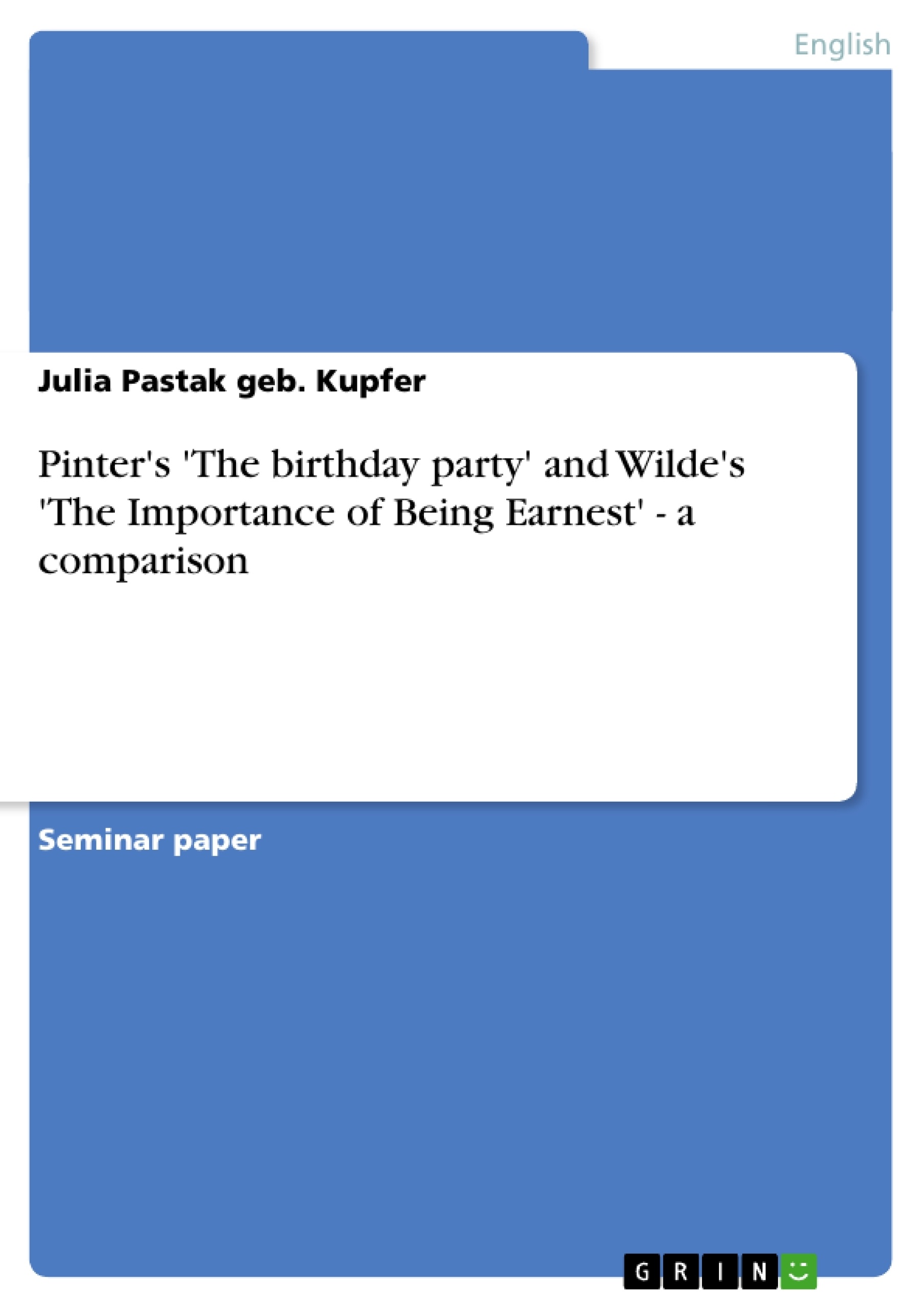It seems that the Theatre of the Absurd is not considered as civil theatre and that means that there must be big differences between the drama we know from Shakespeare or other famous authors and the work of Beckett and his companions. This work is going to define the differences between a classic drama (a comedy) and a modern drama (theatre of the absurd) and it will make them clear using examples from both “The Importance of Being Earnest” and “The Birthday Party” written by Oscar Wilde and Harold Pinter, respectively.
Inhaltsverzeichnis (Table of Contents)
- Introduction
- Comedy- an overview
- The Importance of Being Earnest- parallels to reality
- The aspects of comedy
- Theatre of the absurd- an overview
- Harold Pinter – the Birthday Party
- Conclusion
Zielsetzung und Themenschwerpunkte (Objectives and Key Themes)
This work aims to explore the differences between classic and modern drama by comparing Oscar Wilde's "The Importance of Being Earnest" and Harold Pinter's "The Birthday Party." The text delves into the nature of comedy, the characteristics of theatre of the absurd, and analyzes these dramatic forms through the lens of these two plays.
- The nature of comedy and its historical context
- The characteristics and significance of the "Comedy of Manners"
- An exploration of the theatre of the absurd and its key elements
- Analysis of dramatic techniques and themes in both plays
- Comparison and contrasting of "The Importance of Being Earnest" and "The Birthday Party"
Zusammenfassung der Kapitel (Chapter Summaries)
The first chapter introduces the concept of the theatre of the absurd, emphasizing its departure from traditional, "civil" theatre. It outlines the objective of the work, which is to analyze the differences between classic and modern drama by comparing "The Importance of Being Earnest" and "The Birthday Party."
The second chapter provides an overview of comedy, tracing its origins back to ancient Greece and the "komodia." The chapter also discusses the characteristics of the "Comedy of Manners," focusing on its satirical nature and its use of stock characters. It introduces "The Importance of Being Earnest" as a prime example of this genre.
The third chapter delves into the context of "The Importance of Being Earnest," exploring its connections to Oscar Wilde's personal life and the Victorian era. It highlights the play's satirical treatment of the social and moral norms of the time.
The fourth chapter examines the comical elements of "The Importance of Being Earnest," analyzing the use of absurd dialogue, symmetry, and twin motives to generate humor.
The fifth chapter offers an introduction to the theatre of the absurd, providing a concise overview of its characteristics and defining elements.
The sixth chapter focuses on Harold Pinter's "The Birthday Party," highlighting its significance within the theatre of the absurd tradition.
Schlüsselwörter (Keywords)
This work focuses on the key concepts of comedy, the "Comedy of Manners," the theatre of the absurd, and the analysis of dramatic techniques in "The Importance of Being Earnest" and "The Birthday Party." It explores themes of satire, absurdity, social critique, and the relationship between language and power.
Frequently Asked Questions
What are the main differences between classic and modern drama analyzed here?
The work compares Oscar Wilde's classic "Comedy of Manners" with Harold Pinter's modern "Theatre of the Absurd," focusing on language and social structure.
What characterizes the "Comedy of Manners"?
It is defined by satirical treatment of social norms, witty dialogue, and stock characters, as seen in "The Importance of Being Earnest."
What is the "Theatre of the Absurd"?
It is a form of drama that emphasizes the meaninglessness of human existence and often uses illogical dialogue and situations, exemplified by Pinter's "The Birthday Party."
How does Oscar Wilde use humor in his play?
Wilde uses absurd dialogue, symmetry between characters, and twin motives to satirize Victorian morality.
Is there a connection between language and power in these plays?
Yes, the analysis explores how characters use language to exert dominance or navigate social hierarchies in both comedies and absurd dramas.
- Quote paper
- Julia Pastak geb. Kupfer (Author), 2005, Pinter's 'The birthday party' and Wilde's 'The Importance of Being Earnest' - a comparison, Munich, GRIN Verlag, https://www.grin.com/document/49451



